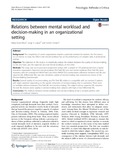Mostrar el registro sencillo del ítem
Relations between mental workload and decision-making in an organizational setting
| dc.creator | Soria Oliver, María | es_ES |
| dc.creator | López Martínez, Jorge S. | es_ES |
| dc.creator | Torrano, Fermín | es_ES |
| dc.date.accessioned | 2018-09-19T09:37:32Z | |
| dc.date.available | 2018-09-19T09:37:32Z | |
| dc.date.issued | 2017 | |
| dc.identifier.issn | 0102-7972 (Print) | |
| dc.identifier.issn | 1678-7153 (Electronic) | |
| dc.identifier.uri | https://hdl.handle.net/2454/30670 | |
| dc.description.abstract | Background: the complexity of current organizations implies a potential overload for workers. For this reason, it is of interest to study the effects that mental workload has on the performance of complex tasks in professional settings. Objective: the objective of this study is to empirically analyze the relation between the quality of decision-making, on the one hand, and the expected and real mental workload, on the other. Methods: the study uses an ex post facto prospective design with a sample of 176 professionals from a higher education organization. Expected mental workload (Pre-Task WL) and real mental workload (Post-Task WL) were measured with the unweighted NASA-Task Load Index (NASA-TLX) questionnaire; difference between real WL and expected WL (Differential WL) was also calculated; quality of decision-making was measured by means of the Decision-Making Questionnaire. Results: general quality of decision-making and Pre-Task WL relation is compatible with an inverted U pattern, with slight variations depending on the specific dimension of decision-making that is considered. There were no verifiable relations between Post-Task WL and decision-making. The subjects whose expected WL matched the real WL showed worse quality in decision-making than subjects with high or low Differential WL. Conclusions: the relations between mental workload and decision-making reveal a complex pattern, with evidence of nonlinear relations. | en |
| dc.format.extent | 14 p. | |
| dc.format.mimetype | application/pdf | en |
| dc.language.iso | eng | en |
| dc.publisher | SpringerOpen | en |
| dc.relation.ispartof | Psicologia: Reflexão e Crítica (2017) 30:7 | pt |
| dc.rights | © The Author(s). 2017. This article is distributed under the terms of the Creative Commons Attribution 4.0 International License, which permits unrestricted use, distribution, and reproduction in any medium, provided you give appropriate credit to the original author(s) and the source, provide a link to the Creative Commons license, and indicate if changes were made. | en |
| dc.rights.uri | http://creativecommons.org/licenses/by/4.0/ | |
| dc.subject | Organizational setting | en |
| dc.subject | Mental workload | en |
| dc.subject | Global relation | en |
| dc.subject | Professional setting | en |
| dc.subject | Subject dimension | en |
| dc.title | Relations between mental workload and decision-making in an organizational setting | en |
| dc.type | info:eu-repo/semantics/article | en |
| dc.type | Artículo / Artikulua | es |
| dc.contributor.department | Psicología y Pedagogía | es_ES |
| dc.contributor.department | Psikologia eta Pedagogia | eu |
| dc.rights.accessRights | info:eu-repo/semantics/openAccess | en |
| dc.rights.accessRights | Acceso abierto / Sarbide irekia | es |
| dc.identifier.doi | 10.1186/s41155-017-0061-0 | |
| dc.relation.publisherversion | https://doi.org/10.1186/s41155-017-0061-0 | |
| dc.type.version | info:eu-repo/semantics/publishedVersion | en |
| dc.type.version | Versión publicada / Argitaratu den bertsioa | es |
Ficheros en el ítem
Este ítem aparece en la(s) siguiente(s) colección(ones)
La licencia del ítem se describe como © The Author(s). 2017. This article is distributed under the terms of the Creative Commons Attribution 4.0 International License, which permits unrestricted use, distribution, and
reproduction in any medium, provided you give appropriate credit to the original author(s) and the source, provide a link to the Creative Commons license, and indicate if changes were made.



